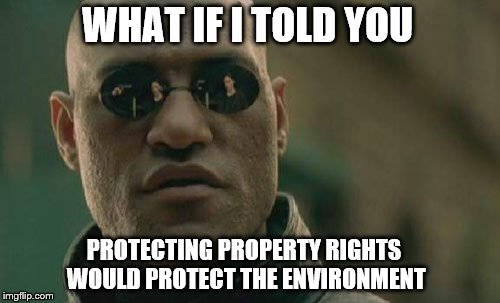A libertarian approach to protecting the environment

This is in part a response to @davidpakman post ‘Steemit Libertarians: how would you address climate change?’
Most of my posts address the topic of property rights, which at a cursory glance doesn’t seem to be related to the environment. Over time, though, I’ve started to notice a commonality between the two subjects. For instance, property rights tend to be a major obstacle for pipeline companies and the fossil fuel industry in general, which is often solved through eminent domain. Examples are furnished by the 2016 debacle over the Dakota Access Pipeline, in which at least one landowner was arrested for protesting construction on her own land, as well as the current holdouts against the Mariner East 2 pipeline. This not only happens in the U.S., but also in other regions of the world where property/land rights are more ill defined. For instance, in the Amazon rainforest drilling is often conducted on Indian land without the informed consent of the communities which reside there. Such was the case in the legal battle between the Achuar and the Canadian company Talismen Energy. Protecting land rights would also be a bulwark against other extractive industries both legal and illegal. For instance, respecting the land rights of the Baka would go a long way to curbing deforestation in the Congo. A series of studies conducted by the World Bank provides ample evidence to corroborate this conclusion.
A six-nation study for the World Bank’s Program on Forests found deforestation rates are significantly lower where communities have legal rights to the forests and government support for management and enforcement, compared with areas elsewhere.
Elsewhere being places where governments have forced communities out of their ancestral lands and handed stewardship over to corrupt eco-guards, something that happens often throughout Africa.
Research from Indonesia showed conflict over land was minimized and investment was encouraged when local communities were involved in designing transportation corridors around proposed mining projects. Another study from Indonesia showed granting long-term rights over mangrove swamps to indigenous people has better protected the critical coastal ecosystems than in areas where the endangered buffers between land and sea are not locally managed.
I am not suggesting that governments shouldn’t have any role in addressing environmental problems. What I am suggesting is that they would be more effective to this end if they did what they are suppose to do in theory, which is to protect property rights, regardless of whether it’s the property rights of farmers and ranchers in the midwest or the indigenous peoples of tropical rainforests. Nothing further should be done until they get this right.
@steem-untalented